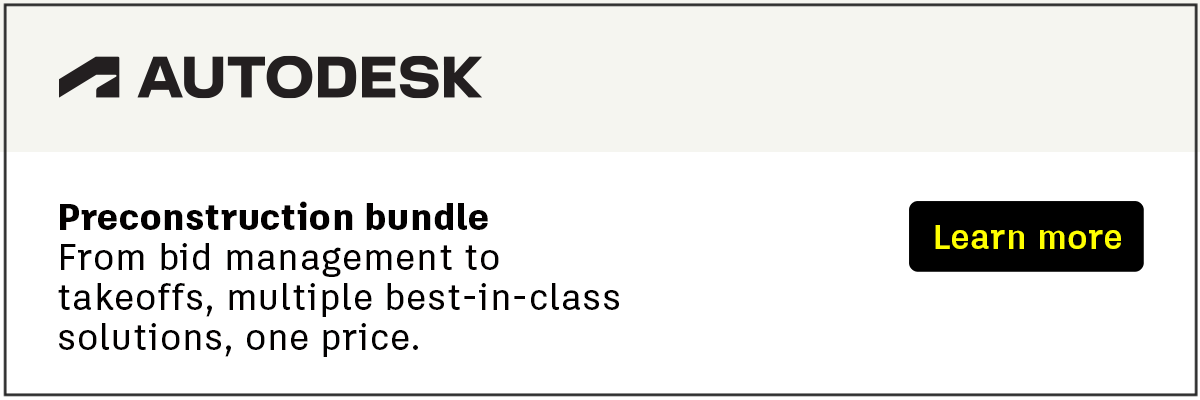
If you're a construction subcontractor hoping to grow your business, you'll be pleased to know that there are reasons to be optimistic this year. Research shows that bidding on US-based projects increased by 5% in 2024 compared to the previous year, and this trend will likely continue in 2025. Commercial construction projects, including hotels, stores, and even military projects, are expected to gain steam this year.
It's no surprise that subcontractors are now seeing more opportunities coming through the pipeline. However, with more bids comes more competition, and rising inflation poses additional risks, increasing costs for materials and labor. Therefore, you must be strategic and organized with your construction bidding and project management practices to mitigate these challenges.
In this post, we'll discuss several ways subcontractors can improve their bidding practices to increase their bid-hit ratio.
Let's get started.
Crafting a winning bidding strategy starts with understanding the process. Here are the key phases that subcontractors go through to secure projects.
Being all over the place with your bidding information is costing you time and money. If you're still using paper documents, email, spreadsheets, or (heaven forbid) a combination of all of the above, you're likely missing out on project opportunities.
For starters, it can take a tremendous amount of time to sift through documents, emails, and sticky notes, so if the information you need is stored in multiple places, you could lose critical information or even miss deadlines entirely.
Manual bid tracking is a cumbersome and costly process, so it's no wonder that ninety-nine percent of subcontractors who track bids in email or Excel miss multiple bid invites a year.
The good news is that there is a simple fix for all of these issues. As a subcontractor, you should adopt a cloud-based bidding solution that enables you to store bidding information and track everything from a centralized location.
With the right platform, you can have all critical details—including deadlines, project details, and communications—in one place so you never have to hunt down for documents or details when preparing your bids.
What's more, cloud-based solutions enable you to access data from virtually anywhere. You don't have to be in your office or in front of the computer to find and retrieve information, so you can take action and move forward with bids even when you're out and about.
All these benefits lead to fewer missed deadlines, less stress, and ultimately more project opportunities.

Construction revolves around strict timelines, and being on time can make or break your chances of winning a project.
This is where technology comes into play. Digitizing how you track and manage bids will streamline your processes, allowing you to get more things done with less time and effort. Essentially, the right technology can help you bid smarter and faster so you can handle higher volumes without running yourself to the ground.
Consider Bid Board Pro, which not only enables subcontractors to digitize and organize their bids but also helps you find more work. Bid Board Pro has a feature called Plan Room that surfaces projects that GCs and owners have shared on BuildingConnected.
You can easily zero in on jobs that fit your business through Plan Room's filtering capabilities, which narrow down projects by work performed, location, due date, and more.
From there, you can quickly access project details and scope of work and then seamlessly integrate jobs into your Bid Board, where you manage all your bid tracking in one place.
Accuracy is critical when submitting—and ultimately winning—bids. You need to ensure that all the costs, quantities, and measurements specified in your bid are correct and on target.
Today, many subcontractors still do construction takeoffs manually—including with paper drawings. To reduce potential errors, save time, and increase bid accuracy, subcontractors should look to streamline the takeoff process using technology.
There are several solutions available that can automate tasks, such as creating takeoffs to ensure accuracy. Takeoff solutions can also make data more accessible, allowing you to see historical information and cost comparisons to develop better estimations in your bids.
Plus, if you're using cloud-based takeoff tools, you can integrate different workflows, enabling you to have better visibility into the process and collaboration with other teams.
All in all, a tight and well-executed takeoff process results in a highly informed and more confident bid—one that not only increases your chances of winning more work but also builds ongoing trust with general contractors who rely on accurate bids.

Construction professionals make smarter decisions and see better outcomes when they have the necessary information. When you're a subcontractor, having the right data not only helps you win more bids, it allows you to win the right bids.
Tracking bid data allows you to surface insights into what's working and what isn't so you can double down on what you're doing well and make changes and improvements where appropriate.
Continuously monitoring your data also makes it easy to spot trends, which can aid in decision-making. Tracking your hit rate, for example, allows you to identify the general contractors that are worth your time, so you can build strong relationships with them. Meanwhile, tracking the performance of estimators and other key players in your team can help you figure out how to step up your team's game.
The benefits of tracking bidding data are clear, yet the majority of subcontractors aren't tracking their bid-hit rate. So, by simply collecting data and keeping an eye on your metrics, you're already propelling your company's bidding strategy ahead of the competition.
Fortunately, getting your hands on the data you need is simple when you're using digital construction tools. For starters, these solutions keep all the information you need in one place, making them more accessible.
Plus, most construction bidding software has built-in construction reporting features that allow you to quickly visualize data and gain insights.
Digitizing your bidding practices enables you to handle more work, stay on schedule, and improve bidding accuracy, all while giving the data you need to continuously improve.
In short, having the right construction technology ensures that you and your team are well-prepared to submit bids that can win you more work.
